Personalities From Plotzk
From the History of Jewry in Plotzk
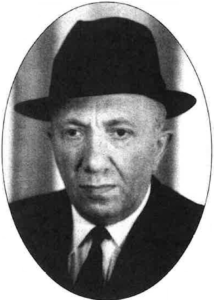
by Rabbi Leib Geliebter, Z”L
Rav Mendel Mendelson biography translated by Yitzchok Brandriss. The Rosh Yeshiva and The Plansker Melamed biographies translated by Rabbi Avrohom Marmorstein.
Rav Mendel Mendelson, ZT”L

The great Rosh Yeshiva, Rabbi Mendel Mendelson, was known among his people simply as “Reb Mendel Chassid.” Born in Plotzk, he began at a young age to learn Torah with great diligence. His entire life, he tirelessly taught Torah and produced many great disciples who were both outstanding in their learning and exceptional for the quality of their avodas Hashem.
I, myself, merited to be among the students of Rav Mende’s yeshiva, which was housed in the small Beis Hamedrash in the city.
Rav Mendel had a particular gift of being able to instill yiras Shomayim (fear of Heaven) in his talmidim. He was constantly immersed in his learning, and those who saw him could not help but be profoundly influenced by his hasmadah. His teaching brought alive our great heritage. Whenever he would mention the name of a Tanna or Amora, you felt as if you were actually seeing the holy sage of the Mishnah or Gemora sranding before you.
Rav Mendel was deeply devout, and separated himself from all manner of self-indulgence. He was careful about Loshon Hara, and did not permit others around him to say a bad word about anyone. He had a genuine and abiding love for every Jew, and with his great heart he shared in the pain of all those who found themselves faced with suffering or sorrow.
There were no Chassidic rebbes in Plotzk to whom a Jew could turn in times of personal trouble. Anyone burdened with tzoros naturally turned to Rav Mendel. Those who were sick, those who had run afoul of the authorities, whatever the nature of their trouble, they all came to Rav Mendel. He would pour out his heart in Tehillim on their behalf and shake the very walls of his Beis Hamedrash with the intensity of his prayers.
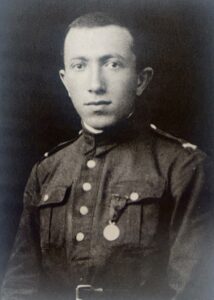
He was poor, and also suffered greatly from difficult personal circumstances, nevertheless, he always wore a smile on his face. He kept up his learning b’hasmadah in spite of all his worries, and made sure that his talmidim absorbed this proclivity as well. He did not allow them to waste a minute in idle conversation and fruitless talk.
Every year, on the 21st of Shevat, he would travel to the ohel of the Tzaddik of Gostinen, and he would bring along his disciples to mark the yahrtzeit. The date fell during the coldest part of the winter, yet he would recite the entire book of Tehillim at the kever. He would do the same, too, upon the yahrtzeit of Rav Zuscha Plotzker, who was a talmid of the Rebbe, Reb Bunim of Pshischa.
In the year 5687 (1927), Rav Mendel fell deathly ill. On the day of his passing, before his soul departed his body, he asked that his tallis and tefillin be brought to him. The gabbaim of the Chevrah Kadisha, Reb Leibish Krishik and Reb Yosef Zeidel, stood by and watched in awe and amazement as he davened. He was fully conscious of the imminence of his petirah, and despite this he was preoccupied with the fact that he had not yet put on tefillin that day.
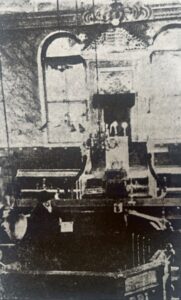
Afterwards, we, his young disciples, were called in. Rav Mendel’s love for his talmidim was limitless, and we all felt like his sons. We approached our rebbe one last time, and he gave each of us his final brochah. I remember quite well his last brochah to me. He prayed that I be saved from the hands of the non-Jews, referring to the fact that I was at the time in danger of being forcibly taken into the army.
And, then, he recited Shema, and his soul departed at the word Echad. The news of his passing spread like wildfire, and created a great stir throughout the city. His levayah was held that very day.
Rav Mordechai Dov Edelberg, Rov of the city, arose to deliver the hesped: “They sent from ‘there’ “ he began, quoting the Gemora. “Who is a person of the World to Come? Someone who comes quietly and goes quietly.” At that, the entire assemblage burst into tears, young and old alike.
Next, words of hesped were offered by his son, Rav Moshe Mendelson, dayan and Moreh Tzedek in Plotzk. Rav Moshe was one of the spiritual giants of his generation, a man of great honesty and integrity, an outstanding lamdon and posek, and a Jew beloved to all for his unassuming modesty and humility. He choked on his tears as he declared: “It is difficult to eulogize a father, and especially a father like my father. The pain of the heart screams from one end of the world to the other.”
Then the second son of the niftar arose to speak, the gaon, Rav Binyomin Mendelson, the Rov of Kommemiut, Eretz Yisrael. But he was also heartbroken, his words could not be heard. It is more accurate to say that his heart spoke rather than his mouth, so grief stricken was he. Indeed, none of us could contain our sorrow the day Rav Mendel Mendelson, our great rebbe, passed from this world. Yehi zichro baruch (May his memory be blessed).
The Rosh Yeshivah: Rav Shmuel Zusha Rudover

Among the outstanding personalities, of whom the city of Plotzk was justly proud, was the great lamdon and Rosh Yeshiva, Rav Shmuel Zusha Rudover. Rav Shmuel Zusha was born in Plotzk and had achieved renown as an illuy, child prodigy, at a young age. The teachers in the city could hardly satisfy his insatiable appetite for Torah. Even as a young boy he studied in the Iittle beis hamedrash, where the brightest minds in the city gathered to study and sharpen each other’s minds. This was also the location of the yeshiva.
When Rav Shmuel Zusha outgrew the resources of his teachers in Plotzk, he went to study with the Gaon, Rabbi Yehoshua of Kutna. Among the disciples of Rabbi Yehoshua, he was known both as an out standing scholar and a person of the highest standard of conduct, who was quick to lend a hand to anyone in need. He also served as a personal attendant of the Kutna Rov, and was a member of the inner circle of his disciples.
Rav Shmuel Zusha stayed in Kutna until his marriage, in the town of Vishegrad, to his cousin, the daughter of his uncle, Rabbi Moshe HaCohen Finkelstein. For many years his father-in-law supported the young couple, enabling Rav Shmuel Zusha to study Torah without distraction, while sharing his learning with a growing number of students. One of his students from that period was the famous Rav Yirmiyah, the Appoler Rov, son of Rav Yaakov Dovid Amshinover and grandson of the old Vurker Rebbe. Rav Yirmiyah studied with him throughout the period of his residence in Vishegrad.
Later Rav Shmuel Zusha moved to Warsaw, where his house swiftly developed into a gathering place for Torah scholars and a home away from home for any guests from Plotzk or Vishegrad. Whoever came to Warsaw for business or personal reasons was compelled to stay with Rav Shmuel Zusha. Everyone was welcome. His guests ate at his table and slept in his bedrooms, feeling every bit as if they were in their own homes.
Rav Shmuel Zusha was in frequent contact with the gedolim of Warsaw. The famed Gaon of Rogachov, Rabbi Yosef Rosen, author of Tzofnas Paneiach, lived at that time in Warsaw and Rav Shmuel Zusha was constantly in his house to disscuss the Torah subjects that perplexed him in the course of his learning. He was also חo very close terms with the esteemed Rov of Warsaw, Rabbi Shlomo Dovid Kahana, with whom he enjoyed discussing various divrei Torah and halachic issues.
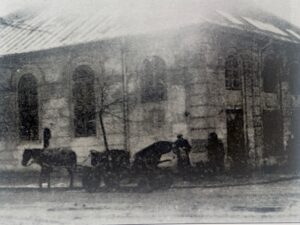
During the First World War his fortunes changed, and Rav Shmuel Zusha was compelled to leave Warsaw. Apart from loss of income, many people left Warsaw at that time because of the extreme shortage of food. People expected that they would find it easier to obtain food in the smaller towns. Rav Shmuel Zusha returned to his native Plotzk, where he was welcomed warmly and appointed as Rosh Yeshiva.
The yeshiva was in poor condition due to the chaos and deprivation brought about by the War, necessitating the departure of many students. Nonetheless, Rav Shmuel Zusha plunged into the task of reorganizing the yeshiva, and soon attracted new students. He gave regular shiurim and produced many outstanding Torah scholars.
Rav Shmuel Zusha served as Rosh Yeshiva from the fall of 1915 until 1929 when he returned to Warsaw. In Warsaw he was able to totally devote himself to Torah study, serving Hashem without distraction. In addition, he gave a daily shiur to some of the outstanding Torah scholars in Warsaw.
The outbreak of the Second World War caused him great anguish and it was immediately obvious that a time of great suffering and tragedy was at hand. The critical food shortage and the cruelty of the Nazis pained him greatly, and his holy soul left this earth חo the eve of Yom Kippur 5700 (1939). He was buried in the historic Warsaw cemetery.
Rav Shmuel Zusha was the son of my grandfather; Rav Shlomo Yosef, and a brother of my dear mother; Yiskah Chaya Geliebter.
The Plansker Melamed
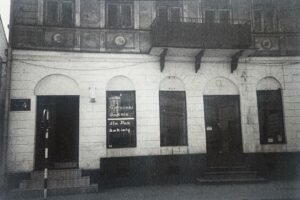
Among my fondest memories of my hometown of Plotzk in pre-war Poland, is of my teacher, Reb Shimon Dovid, who was known as “the Plansker Melamed.” He was not just your average teacher, you see. He was an outstanding talmid chachom – a real Torah scholar who was also blessed with a rich and talented personality. There were those melamdim who had drifted accidentally into the teaching profession; perhaps after failing in business or not succeeding in some other livelihood. Reb Shimon Dovid was quite a different story. His whole desire in life was to teach and share his knowledge with his young charges. He knew how to educate children, explaining everything in a way that was easily understood and appreciated.
He always seemed to perceive what was going חo in a child’s mind, and would
have been a great psychologist! He recognized a student’s abilities, and helped each child reach his potential. But that was not enough for him. After the long hours of teaching, he worked to expand and perfect his own knowledge of the educatonal process by reading books and research journals חo education.
Naturally, his teaching did not make him rich. He lived in an apartment with one room and a kitchen. This one room served as his bedroom, his receiving room to meet with visitors, and as the classroom where he taught. There was no elegant furniture in the room, and the only “luxury” he possessed was a large bookcase with a good selection of seforim including the highly prized Vilna Shas. (The finest edition of the entire Talmud was printed by the Romm family in Vilna, Lithuania.) This possession was his pride and joy, and late at night after a hard day of teaching his students, he would take out its volumes and study halfway through the night.

In addition to being a talmid chachom, Reb Shimon Dovid was also a talented mathematician; not only was he familiar with all the standard mathematical equations and methods but he also devised his own methods and formulae for algebra and geometry. In this regard he was truly unusual, and there was no one around him who could rival his knowledge in this area. He knew enough to serve as a professor of mathematics at a university.
When a student displayed an aptitude for mathematics, he would give the child extra time and attention to help develop his ability. A friend of mine, Hershel Vilensky, who studied with Reb Shimon Dovid together with me, had this kind of ability. Our teacher gave him special attention, and under his guidance he truly flourished, eventually becoming a professor of mathematics at the University of Crakow.
Reb Shimon Dovid was also a master of the Hebrew language. Altogether he was an exceptionally talented person, and many of his skills were never used to their fullest capacity. As one might expect, Reb Shimon Dovid did not value material riches. However, the only material wish that he ever expressed was his desire to have the most beautiful esrog in Plotzk. In order to have the money for this one luxury he would scrimp and save the whole year, putting aside pennies until he had the money needed. And when Succos arrived, no one had a more beautiful esrog than his, and no one derived as much joy and pride as he did in this modest luxury.
Reb Shimon Dovid told me that during the First World War there was much debate among the poskim about the right procedure to follow given the extreme shortage of esrogim. Entire communities did סחt have even one esrog. At that time my father, Moshe Mordechai Geliebter, received a gift from a merchant in Warsaw – two esrogim! One of them he kept for himself and the second one he refused to sell for any price, but gave it as a gift to Reb Shimon Dovid, know ing how much he treasured this mitzvah. Reb Shimon Dovid never forgot this special kindness. He held my father in very high esteem, and often told me how much my father had accomplished in his own quiet way, always operating behind the scenes and avoiding publicity.
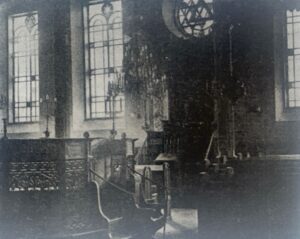
One of the most prominent citizens of the town was a wealthy man who suddenly suffered a reversal of fortune and lost all of his money. Nס one knew of his changed circumstances, but he also knew that Reb Moshe Mordechai was a man who could keep a secret as well as being a compassionate person who was quick to do a favor – so he came to him early one Friday morning. He explained that his situation was desperate and after having exhausted alI possibilities he was now left with nothing in his house tס eat for Shabbos. My father immediately gave him ten rubles, and then arranged to help him with a much more substantial sum, eventually enabling this man to re-establish his business.
Reb Shimon Dovid was a Gerrer chassid, one of the most respected chassidim in the shtible. He was given a place by the mizrach vant (eastern wall) at the front of the synagogue and everyone treated him with great respect and concern. Yet he was a humble person, quiet and unassuming, who never allowed anyone to make a fuss over him.
Reb Shimon Dovid lived to a ripe old age. He died when he was over eighty years-old, leaving behind a wonder full legacy and a good name in our town.


